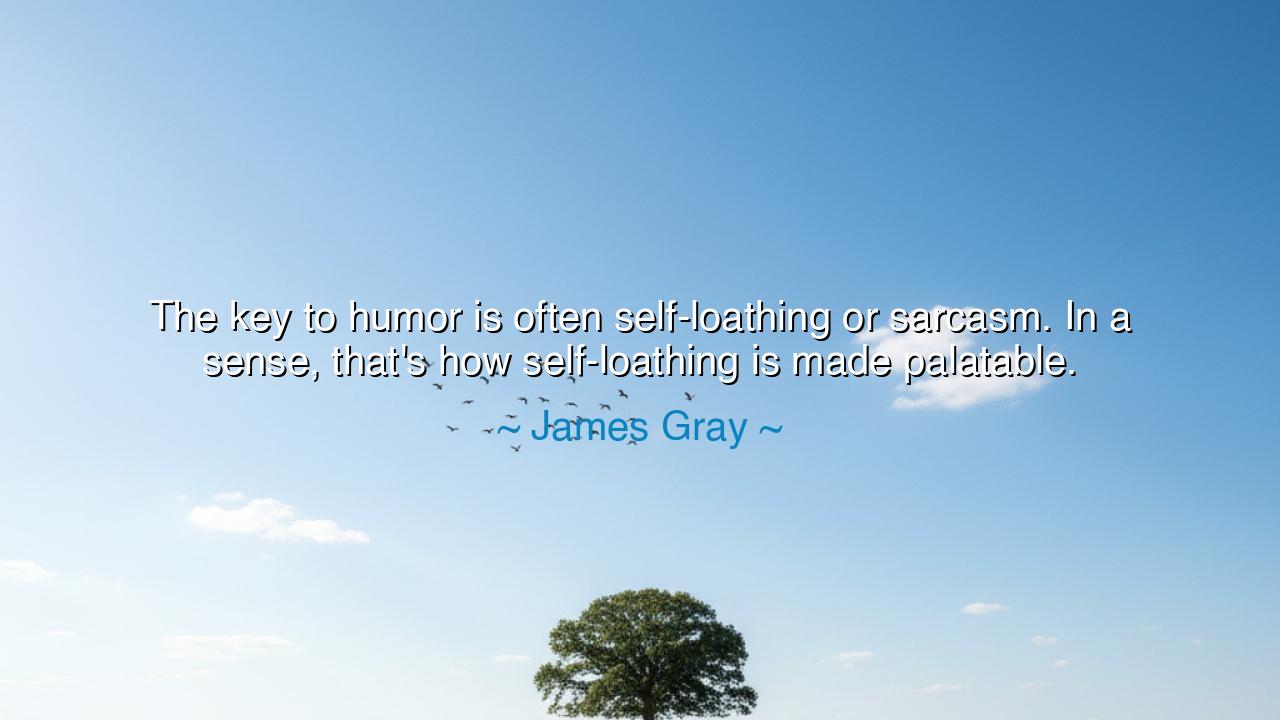
The key to humor is often self-loathing or sarcasm. In a sense
The key to humor is often self-loathing or sarcasm. In a sense, that's how self-loathing is made palatable.






The words “The key to humor is often self-loathing or sarcasm. In a sense, that’s how self-loathing is made palatable” by James Gray are not merely an observation of comedy, but a profound reflection on the human soul. They reveal a paradox as old as thought itself — that pain can be the seed of laughter, that our deepest wounds often give rise to our brightest wit. In Gray’s words lies a truth that every philosopher, poet, and fool has known: that humor is not born from comfort, but from conflict — the delicate art of transforming self-loathing into something that can be shared, softened, and understood.
To say that humor springs from self-loathing is to acknowledge that the human spirit carries its own shadows. Every heart, no matter how noble, knows the voice of doubt — that quiet whisper that says, you are not enough. But where some surrender to that voice, others learn to play with it. Sarcasm, then, becomes the armor of the wounded mind — sharp, reflective, cutting through despair with the blade of irony. The one who can laugh at their own pain has already disarmed it. They have taken what would destroy them and turned it into a story, a performance, a moment of shared recognition. In laughter, the unbearable becomes bearable.
This truth has been known across centuries. The Roman satirist Horace mocked the vanity of men not from cruelty, but from understanding. He saw folly everywhere — including within himself — and so his laughter became mercy, not malice. Similarly, the great Oscar Wilde, who knew both triumph and tragedy, turned his own insecurities into artful wit. His humor was born of heartbreak, yet through it he illuminated the beauty and absurdity of being human. In both men, we see the same alchemy James Gray speaks of: the turning of self-loathing into laughter, the transmutation of pain into poetry.
There is something deeply compassionate in this kind of humor. It invites others to see their own reflection in our imperfections. When someone jokes about their flaws, it is not weakness — it is communion. It says, I, too, am broken. I, too, have stumbled. And in that shared admission, laughter becomes healing. For to laugh together at our flaws is to strip them of their power. What was once shame becomes light. What was once private sorrow becomes collective strength. In this way, humor is not only palatable — it is redemptive.
But Gray’s wisdom also carries a warning. Self-loathing, when untransformed, can consume the soul. It is the fire that, if left untended, burns inward. Humor, then, is both remedy and restraint — a way to vent the flame without letting it devour. Yet one must take care that the laughter does not become cruelty, that sarcasm does not harden into cynicism. The ancients warned of this: that bitterness disguised as wit is still poison. True humor, born of humility and self-awareness, uplifts even as it wounds. It makes suffering poetic, not corrosive.
Consider Robin Williams, whose laughter lit the world even as his heart bore the weight of sorrow. His humor was wild, generous, and self-revealing — a dance between madness and meaning. He transformed his pain into laughter that healed millions. And yet, his story reminds us of the fragility behind that laughter — that the brightest humor often hides the darkest storms. Williams embodied the paradox James Gray describes: humor as both salvation and symptom, as the mask that both reveals and protects the soul.
And so, my friends, let this be your lesson: do not fear your flaws, and do not bury your pain. Instead, learn to name it, to play with it, to turn it into something that connects rather than divides. Let your laughter be a song of survival, not surrender. Use humor to remind yourself that imperfection is the essence of being human, and that even self-loathing can be tamed by compassion. For as James Gray teaches, when we make our pain palatable through laughter, we do not deny it — we redeem it. And in that redemption, we discover one of life’s deepest truths: that joy is not the absence of sorrow, but its transformation into light.






AAdministratorAdministrator
Welcome, honored guests. Please leave a comment, we will respond soon